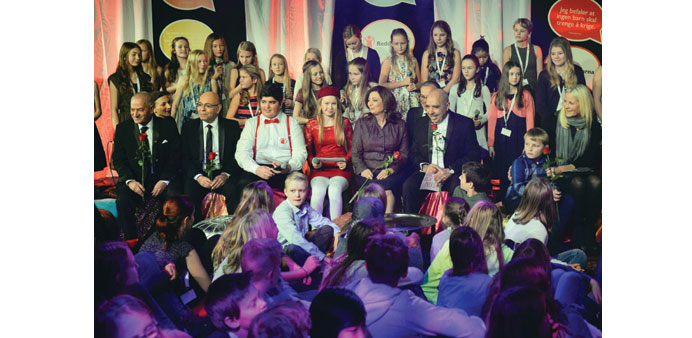The winners of the 2015 Nobel Prize, Tunisian National Dialouge Quartet members, (Left-Right)
Secretary General of the Tunisian General Labour Union (UGTT) Houcine Abassi, President of the Tunisian Order of Lawyers Mohamed Fadhel Mahfoudh, President of the Tunisian Confederation of Industry, Trade and Handicrafts Wided Bouchamaoui and President of the Tunisian Human Rights League Abdessattar Ben Moussa, attend the non-profit organisation Save the Children’s Peace Prize party together with Crown Princess of Norway, Mette-Marit (right) and Prince Sverre Magnus at the Nobel Peace Centre in Oslo yester.
Agencies
Oslo
A Tunisian pro-democracy group accepted the Nobel Peace Prize yesterday and set the fight against terrorism and helping Palestinians to achieve self-determination as global priorities.
The National Dialogue Quartet, which won the Peace Prize for helping build democracy in the birthplace of the Arab Spring, accepted the award at a ceremony in Oslo held under tight security following the armed attacks in Paris on Nov 13.
“Today we are most in need of making the fight against terrorism an absolute priority, which means perseverance on coordination and cooperation between all nations to drain its resources,” Hussein Abassi, head of the Tunisian General Labour Union, one of the quartet honoured, said in a speech.
“We need to accelerate the elimination of hot spots all over the world, particularly the resolution of the Palestinian issue and enable the Palestinian people the right to self-determination on their land and build their independent state,” he said.
Security precautions loomed large over the banquets and concerts for hundreds of political, intellectual and business leaders attending the lavish Nobel awards ceremonies held jointly in Oslo and Stockholm.
“Security is higher than it would otherwise have been because of the situation in Europe,” Johan Fredriksen, chief of staff for Oslo police told Reuters, referring to the Paris attacks in which 130 people were killed.
The quartet of the Tunisian General Labour Union, the Tunisian Confederation of Industry, Trade and Handicrafts, the Tunisian Human Rights League and the Tunisian Order of Lawyers was formed in the summer of 2013.
It won the award for the role it played in the peaceful transition of power in Tunisia in a region struggling with violence and upheaval.
With a new constitution, free elections and a compromise arrangement between Islamist and secular leaders, Tunisia has been held up as a model of how to make the transition to a democracy from dictatorship, said Kaci Kullman Five, head of the Norwegian Nobel Committee.
Last year Tunisia held successful legislative and presidential elections but the country has been hit by violence this year. In March, Islamist gunmen killed 21 tourists in an attack at the Bardo Museum in Tunis, and 38 foreigners were killed in an assault on a Sousse beach hotel in June.
“In this time of terror, the threats against Tunisia and the Tunisian people are indistinguishable from the threats against other countries,” she said in her speech.
“I came here to share this extraordinary moment with the whole of Tunisia. I am so proud,” said Haddad Fayssal, a 39-year-old Tunisian engineer from Paris, draped with the red-and-white flag of the North African nation over his shoulders.

